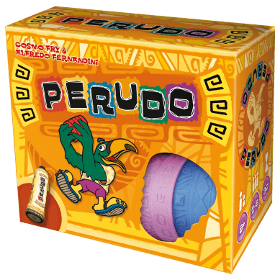Spēlē Perudo un 1229 citas spēles tiešaistē.
Nekas nav jākačā - spēlē pa tiešo no pārlūka.
Ar saviem draugiem un tūkstošiem spēlētāju no visas pasaules.
Par brīvu.

Spēlē Perudo un 1229 citas spēles tiešaistē.
Nekas nav jākačā - spēlē pa tiešo no pārlūka.
Ar saviem draugiem un tūkstošiem spēlētāju no visas pasaules.
Par brīvu.

Noteikumu kopsavilkums
Attention!!, there are a lot of variations of Perudo. The variation implemented on BGA has been the Asmodée version. Unfortunately for this version of the game there seems to be no online English rule book. The link on the game page links to another version of Perudo and consiquently it discusses rules that are not implemented on this BGA version.
Rules for Perudo (Asmodée version)
Goal of the Game
Whenever we use he it can also be read as she
Be the last remaining with at least 1 die in play. If you succeed in being the last player standing with one or more dice in your hand you are the winner!
Set up
Each player starts with 5 dice which have the following faces:
- Paco
- value 2
- value 3
- value 4
- value 5
- value 6
Based on the amount of players the game begins with the following number of total dice:
| Nr. players | Nr. dice |
| 2 | 10 |
| 3 | 15 |
| 4 | 20 |
| 5 | 25 |
| 6 | 30 |
Round order
All players roll their dice and check what they rolled. The first player (randomly selected) starts with an opening bid; he proclaims a die value and the amount of dice in the playfield having this exact value. He can either try to make a educated guess and try to be really close to the truth, based on his own hand, or he can try to bluff and lure other players into losing a die.
Important: An opening bid can never begin with a bid of pacos, unless a player is Palifico.
After a bid is placed, the turn is passed on to the player on his left, this player has 2 options:
- If he thinks that the last bid was wrong he can say "Dudo" (i doubt)
- If he thinks the last bid is reasonable, then he must increase the last bid.
Option 1: calling Dudo
As soon as Dudo is called all players must reveal their dice. All dice that match the bid are counted.
The bid is correct if the number of dice, with the correct value, is higher or exactly the same as the bid.
In this case the player who called Dudo was wrong to have doubted and loses one die.
The bid is false when the number of dice, with the correct value, is lower then the bid.
In this case the player who called Dudo was correct to doubt the bid and the player who placed the bid has to admit he was overstating things and loses one die.
The moment a player loses his last die, not a single die left in his hand, he is out of the game. From this point on that player does no longer participate in the game.
Option 2: increasing the bid
To increase a bid a player has to choose one of the following options:
- increase the number of dice, thus the value stays the same
- increase the value on the die, thus the number of dice stays the same
Once a new bid has been established the turn is passed on to the next player to the left etc. When Dudo has been called and a player lost a die, the player that lost his die starts a new round. Or if the player that lost a die lost his last die the player left of the eliminated player starts.
Special rules
The side of the die with the paco on is special This side counts as a joker for the number of eyes when a Dudo is called.
As example: The bid on which a Dudo was called is: 9 dice with a value of 3.
| Die faces | ||||||
|---|---|---|---|---|---|---|
| Player | Paco | 2 | 3 | 4 | 5 | 6 |
| Mike | 1 | 2 | 1 | 0 | 0 | 1 |
| Lucy | 0 | 3 | 1 | 1 | 0 | 0 |
| John | 3 | 0 | 1 | 0 | 0 | 1 |
| Susan | 1 | 0 | 1 | 1 | 1 | 1 |
There are thus 4 dice with a value of 3. However, there are also 5 pacos as these count as jokers
we add them to the 4 dice with a value of 3 to get a total of 9 dice with a value of 3.
The Bid is thus valid and the player who called Dudo loses a die.
As pointed out above an opening bid cannot be based on pacos, unless a player reached Palifico (more below). However, during the game you can make a bid of pacos. This is the only exception to the rule you always have to upbid. As placing a bid of pacos provides a way to decrease the amount of dice. To place a bid with pacos the number of dice is divided in half, rounded up.
Example: from 9 dice with a value of 3 one can make a bid of 5
(9/2=4.5 -rounding up->5) dice with a paco.
The Next player can now choose to either
- Increase the number of dice with a paco
- Increase the value on the die. In order to do this his bid of dice must be at least the double amount of the last bid with pacos while adding one extra.
Example: So from 5 dice with paco he could go to 11 (5*2+1=11) dice with value 3.
(or thus any number of dice exceeding 11)
Palifico
The moment a player has only one die remaining this player has reached Palifico. During the next round the Pacos do not count as jokers and an opening bid with paco's can be placed. Important: during this round the value cannot be increased during bids. Solely the amount of dice can be increased until a Dudo is called. The player loses his Palifico state once the first round where he had a single die ends. Meaning that the next round is a normal round again eventhough the player only has 1 die (if he did not get eliminated).
Optional rules
- Calza!
A player can call out a Calza (the bid is exact) before a player places a new bid. Everyone around the table, with the exception of the player that placed the last bid, is able to call out calza. If the player that called out Calza was correct he regains one of his lost dice. However, if he was wrong he loses a die. In either case the player who called out Calza will start the new round. - The lost dice are visible
When the lost dice are visible the game is slightly easier as you do not need to memorize how many dice have yet quite the game and thus what would be the max you could bid.

 Spēle Perudo ir Cosmo Fry, Alfredo Fernandini autordarbs, un tās izdevējs ir
Spēle Perudo ir Cosmo Fry, Alfredo Fernandini autordarbs, un tās izdevējs ir 